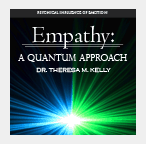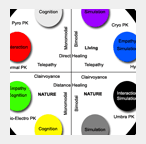Empathy
Parapsychology Articles, Papers and Books
Home > Articles > Psychical Phenomena > Extrasensory Perception > Empathy
![]()
|
| NEWSLETTERS |
| Get the best from QPsychics.com in your inbox! |
|
| PARAPSYCHOLOGY ORGANIZATIONS |
"With confidence in the importance of utilizing the investigative mode of the established sciences in order to inquire into the authenticity and to potentially explain the nature of psychical phenomena."  |
 |
 |
 |
 |
Phases of Empathy
Empathy is the psychical influence of emotion via experient influence over the emotional basis of consciousness and the mental and physiological processes associated with a wide variety of emotional experiences. In regards to phases of empathy, current modeling suggests three phases. (1) The first phase is characterized by the formation of a quantum entanglement state of one human brain with another human brain or one human brain and an informational system within Nature. During this phase, the quantum states of the brains of the subjects, or one brain and the informational system of Nature, are entangled via either spatial proximity or some form of interaction or association. (2) The second phase is characterized by the sustainment of the entangled state of the two brains, or one brain and the informational system. In this phase, it is assumed that the formed entangled state of the two brains, or one brain and the informational system, may hold for an extended period of time in a region of the brain under special conditions. (3) The third phase is characterized by the collapsing of the entanglement state between the two brains, or a brain and informational system. It is when the entangled state of the two brains, or brain and information system, is collapsed by the measurement of one of the brains that the brain states of both individuals synchronize to be definite states from an entangled state. At this time, in regards to tele-empathy, the other individual, at-a-distance, will perceive the change. In regards to clair-empathy, the experient, regardless of space-time variables associated with the informational system or the group or populous they retrieve emotional experiences regarding, will perceive the change. Such modeling continues by assuming that when information is in an entangled state (superposition) no definite perception in relation to the state yet exists. However, when the superposition state collapses into a defined state, a definite perception in relation to the collapse appears. It is at this time that the assumed empathic effect becomes perceptible.
(Adapted from the book “Empathy: A Quantum Approach - The Psychical Influence of Emotion” by Theresa M. Kelly, MsD.)
|
|||
Related Articles |
|||

